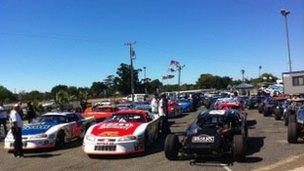Is the US caught in the slow lane?
- Published
- comments
People living in bankrupt Stockton give their verdict on the US economy
At a California racetrack the souped-up cars that have been revving their way around the circuit stop and fall silent.
Their roar is replaced by a deeply soulful rendition of the Star-Spangled Banner as a gigantic American flag is unfurled across the course as part of 4 July celebrations.
The race commentator, Wild Wayne, gives a patriotic pep talk emphasising that Independence Day means more than an opportunity to eat hot dogs and sink a few Buds.
For a nation so geographically isolated from any rivals and for a people so brimming with self-confidence it still amazes me how much emphasis is placed on the very word "American", whether it is placed before "hero" or "race car", as an affirmation of identity.
Mind you, when I observe that America must be the most showily patriotic country in the world, an American friend points out the celebration of the Queen's Jubilee in Britain was hardly discreet and muted.
Still, I think there is a nostalgic nuance to our patriotism, whereas America has traditionally looked to the future.
Unstoppable damage
But the US is changing and at the moment there is an uneasy edge to the pride and the patriotism.
There have been a whole host of books about American decline. There is also a more general malaise, a worry that America, still the biggest economic and military power in the world, has lost its place and its way.

Only a few people at the race track felt happy with the direction the country was moving in
Such fretting is not exactly new, but there are differences between today and the Sputnik moment, external, or of fears of Japan's rise, external, or of post-Vietnam angst.
For a start, conservatives argue that President Barack Obama has embraced decline, external, and made America less forceful on the world stage and less successful at home.
Some of those I spoke to at the racetrack thought the country was coming back up, and going in the right direction, but they were a small minority.
More typical were these comments:
"It's going in the toilet. The economy is shot, the government sucks. I think America is still number one but it won't be if they carry on this way"
"The direction is going down, we're starting to struggle"
"I'm not really happy, I want my old America back. I think we're slowly dropping, we've lost our edge and need to be the dominant force again."
But others argue it is the right who are to blame, by allowing for no compromise, and so giving the impression that politics itself is broken and useless.
The British journalist Ed Luce, whose book Time To Start Thinking is subtitled America In The Age Of Descent, argues that its failure to invest in infrastructure, research and education has been hugely damaging.
He told me: "The American dream no longer exists. If you compare income mobility, for example, you're twice as likely to move up an income group - up a class - in Canada or Germany as you would in the US.
"You're as likely to move up a class in Britain, and Britain's at the bottom of the league. It's got to stop these trends; otherwise it'll cease to be the America we admire; and I think it's to a large extent already ceasing, or has ceased, to be the America we admire.
"That foundational creed of a country that offers equality of opportunity, of a country that has great class mobility, that's much more seriously that soft power you'd associate with America, its universal attractiveness.
"That's really in headlong decline and I think that is a far more serious sense of concern than the relative economic decline that we should expect anyway with China and India and others lifting themselves out of poverty."
'Sense of loss'
Luce says that middle class income has been hollowed-out and unless there is a return to a more pragmatic politics the damage will be unstoppable.

Experts say America will look and feel strong for decades to come
"This deepens all the time, this trend; to go from a third of the world economy just 12 years ago to under a quarter now is unprecedented in any historic comparison. This is a headlong relative decline that America is in; and that's likely to accelerate unless America regains its sense of pragmatism.
"Pragmatism is a word coined in this country, it's the American philosophy; it's about repairing your faults and it's missing in action, and it's been missing in action for quite a long time, and unless Washington can regain it, this is going to steepen this decline, it's going to get more accelerated."
Limited influence
Not everyone agrees, external. Most Americans think decline can be halted, if it even exists in the first place.
Robert Kagan, external, author of The World America Made, says that the world would be a different - a worse place, external - without a strong America. But he feels the worries about decline have been overdone.
"I think at any time when you have a deep economic recession, which the US has been in, people tend to get pessimistic. The US has repeatedly gone through periods of declinism, concern that other countries were passing it, whether it was Japan, the Soviet Union, and now China.
"But I think if you look at it analytically and from a historical perspective I don't think there is any reason to think America really is in decline.
"Now people have a mythical sense of the past, today people say the US can't get what it really wants anymore, can't tell other countries what to do, it doesn't seem to be able to solve the Middle East peace crisis and my answer is: when could it? When did the United States have all this power?
"American influence is always more limited than people think. Nevertheless, America is still the most influential power in the world today."
Kagan says that part of the problem is that people lump together America's challengers abroad, external as the Brics.
He argues a rising Brazil or India is not a threat to America, and the focus is really China. He says the rise of that country has actually made others in the region need America more.
"I subscribe to the theory that what goes up must come down and eventually the US will lose influence, I just am not convinced we're there yet.
"I'm not saying there is nothing to worry about, the US has significant fiscal problems that it has to address and we have not addressed it so far and I hope in the future we will. But the idea that the Americans are worried about the state of the country is deep in the DNA.
"You can look at practically every 10 or 20 years throughout American history, there's been this sense of loss, of something lost, of a decline. Eventually it'll be right, I just don't think its right now."
At the racetrack a gleaming red car, which had been flying a large stars and stripes out of a back window is at the back of the pack, overtaken by all the others. It eventually has to limp off the track and give up the game.
That is not going to happen to America. Even if decline in relative power is inevitable, it has such economic influence and military might that it will look and feel strong for decades to come.
The notion of "decline" lumps together questions about the domestic economy, power abroad, political direction and simply the mood of the people - so no simple conclusion is likely to be correct.
Indeed, it is possibly more important to ask the right questions than have the right answers.
And the real question is whether there is a trend, and whether sharp political divisions at home and the problems they leave unsolved undermine America's quest to find its rightful place in a changing world.